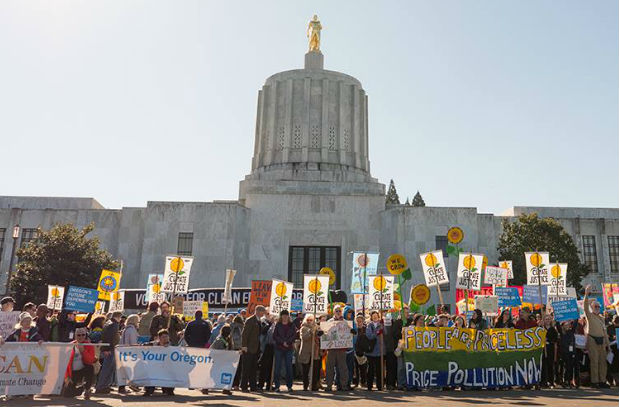Monday’s Earth Day celebrations were a good reminder of what is at stake this year. With just 11 years left to limit climate catastrophe, urgent action is needed on a wide range of strategies to transition to a clean energy future.
With the Oregon legislature’s 2019 session past the half way point, we’re happy to report that most of our priorities are still being considered, and one – a permanent ban on offshore oil drilling – has already become law! With just over two months left to pass bills that make climate progress this year, we’re working hard to get the following bills over the finish line.
Clean Energy Jobs: Capping pollution and investing in solutions
Clean Energy Jobs continues to move closer to passage. The 2019 Clean Energy Jobs bill – House Bill 2020 – was introduced in early February, with many of the critical components for a strong climate program including an economy-wide cap and strong emissions reductions targets. After a series of public hearings across the state, the Co-Chairs of the Joint Committee on Carbon Reduction introduced an amendment to further strengthen the bill:
- Removes exemptions to hold the largest polluters in all sectors accountable.
- Allocates half of the investments to benefit those most impacted by climate change, including communities of color, Tribes, rural communities, and low-income families, and
- Maintains a strong and declining cap economy-wide, with mandatory emissions reduction targets of 45% below 1990 levels by 2035 and 80% by 2050.
Status: One more package of amendments is expected before the Joint Committee on Carbon Reduction votes on the bill. After more than 10 years developing this climate program, Oregon is poised to pass HB 2020 this year and take a leading role in addressing the climate crisis.
Expand renewable energy
Rooftop solar: House Bill 2618 would create a grant program to reduce the cost of solar for homes and businesses. Passing this bill would reinvigorate Oregon’s solar industry, while reducing carbon emissions, expanding clean energy jobs, and saving consumers money on electricity bills.
Status: A policy committee voted to advance HB 2618. It is currently in the Ways and Means committee.
Renewable gas: Senate Bill 98 would help enable gas utilities to provide renewable gas generated from sources like wastewater and dairies to our homes and businesses, reducing emissions.
Status: A policy committee voted to advance SB 98. It is currently in Ways and Means.
Better protect Oregonians from fossil fuels
Offshore oil drilling ban: Senate Bill 256 permanently bans offshore drilling off the Oregon coast. Oregon is now protected from this dangerous practice and has reduced where fossil fuel extraction can take place.
Status: Both chambers passed SB 256 and it has been signed into law!
Fracking ban: House Bill 2623 would prevent any new fracking for oil or gas in Oregon for the next 10 years. If passed, HB 2623 will add important protections for our environment, people, and climate.
Status: The House of Representatives passed HB 2623 with strong bipartisan support, and the Senate Environment and Natural Resources committee is now considering it.
Oil train safety: Of the multiple bills proposed to improve safety standards for oil spills from trains, only House Bill 2209 is still moving forward. House Bill 2064 and Senate Bill 99 did not pass out of their policy committee in time. We are continuing to push for strong safety protections, while supporting the improved oversight of trains carrying oil by rail in HB 2209.
Status: A policy committee voted to advance HB 2209. It is currently in Ways and Means.
Expand equitable climate action
Equity in utility planning: House Bill 2242 adds equity as a consideration to inform the Public Utility Commission’s actions and creates a new office at the PUC to advocate for low income and environmental justice communities. If passed, it would help our PUC – which regulates Oregon’s major electric and gas utilities – develop solutions that better address the needs identified by people of color and low income communities.
Status: A policy committee voted to advance HB 2242. It is currently in Ways and Means.
Home weatherization incentives: House Bill 3094 would create a new incentive to contractors and building owners to make efficiency upgrades to low and moderate income homes. If passed, the bill would support investments in energy efficiency upgrades like home weatherization to save low income residents’ money and reduce climate emissions from home heating and cooling.
Status: A policy committee voted to advance HB 3094. It is currently in Ways and Means.
Promote clean transportation
Electric vehicle transition: Recognizing that transportation accounts for nearly 40% of Oregon’s climate pollution, Senate Bill 1044 establishes legislative goals and direction for transitioning to electric vehicles in Oregon. It also allows schools to build charging stations with funds it receives through utilities’ Public Purpose Charge, and creates a more efficient process for utilities to invest in charging stations at public locations.
Status: The Joint Transportation Committee will likely hear SB 1044 soon.
Electric vehicles charging: House Bill 3141 requires that new multi-family housing support electric vehicle charging and makes it easier for the public to use EV charging stations at government buildings.
Status: A policy committee voted to advance HB 3141. It is currently in Ways and Means.
Dirty diesel: House Bill 2007 strengthens diesel emission standards for medium- and heavy-duty trucks and buses, and makes Volkswagen Settlement Funds available to replace older diesel engines with cleaner alternatives. Passing this bill would reduce toxic diesel exhaust, which contributes to climate change and is linked to serious health problems including an increased risk of cancer.
Status: It is currently in the Rules Committee.
Driver’s license for all: House Bill 2015, the Equal Access to Roads Act, would expand eligibility for a standard driver license to all Oregon residents, regardless of citizenship status. Everyone deserves clean air and water, and a chance for a healthy and vibrant life – including Oregon’s immigrant communities, who are on the frontlines of climate change.
Status: HB 2015 is currently in the Joint Transportation Committee.
Elevate climate action in state government
Oregon Climate Authority: Senate Bill 928 lays out the Governor’s bold proposal to create a new state agency that focuses exclusively on addressing climate change and the transition to clean energy. The Oregon Climate Authority could elevate the importance of climate in state government and provide better coordination among state agencies to address the climate crisis.
Status: A policy committee voted to advance SB 928. It is currently in Ways and Means, along with the corresponding budget bill for the agency (HB 5044).
Thanks for all that you have done and will continue to do to make this a legislative session where Oregon steps up and takes bold action for the climate! We will continue to be in touch with opportunities to push many of these priorities over the finish line by the end of June. over the finish line.




